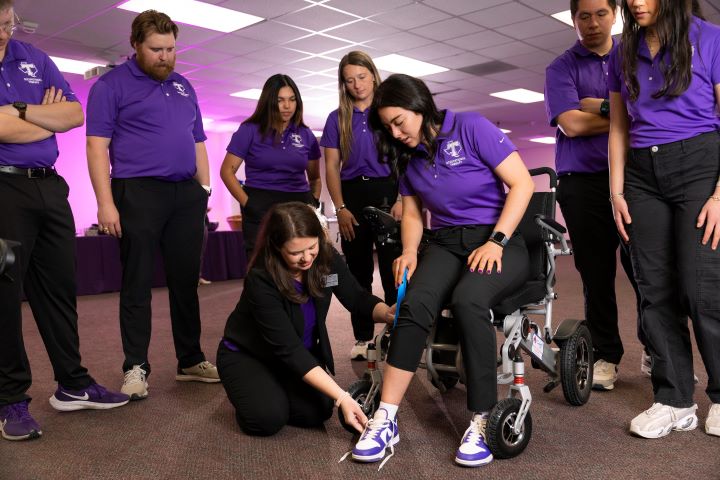Doctorate in Occupational Therapy (OTD)
Tarleton State University’s Doctorate of Occupational Therapy program provides an innovative, rural focused curriculum that prepares students for professional, scholarly and leadership roles in practice. Successful completion of the didactic and clinical components of the program can lead to national registration as an occupational therapist and state licensure. Following a 8 semester cohort model, the Doctorate in Occupational Therapy can admit 50 students each year.
As graduate of Tarleton State’s OTD degree program, you will have opportunities to apply and innovate in occupation-base card, engage confidently in interdisciplinary teams and specialize in rural healthcare and community opportunities. The degree program offers study abroad, advanced clinical courses and specialty practice electives to enhance your education experience. As you progress through the curriculum, you are challenged to create, innovate and advocate towards change, accessibility and participation in the community.
What is Occupational Therapy?
As part of the health care community, the focus of occupational therapy is to facilitate participation and engagement in meaningful, purposeful activities in their daily lives.
Stemmed from the root word, occupation, occupational therapy focuses on using tasks, activities, groups, support, virtual experiences, or education to engage in occupations: those things that matter to an individual, group or population.
Occupational therapy considers the complex and fluid relationship between clients, activities and their environment. Occupational therapists work with individuals, families, caregivers, educational providers, employers and community members to facilitate engagement in valued daily activities that may have had disruption due to injury, illness, social/emotional deficits, developmental delays or the aging processes.
What can you do with your OTD?
After earning your OTD, you will be eligible to sit for the National Board for Certification in Occupational Therapy exam and, upon receiving a passing score, you will be eligible for a OT practice license in your state. Tarleton State’s OTD program is an affordable option for students in Texas as students are able to complete their degree in 8 semesters/86 credits.
Careers in OT
The job market for OTs in the state and nation is strong and candidates from the Tarleton State’s OTD program are well equipped to seek out jobs outside of traditional OT job postings as they are innovators, creators and problem solvers. Traditional OT jobs may include hospitals, rehab facilities, skilled nursing facilities, school based, clinic based, academia and home health. Additional jobs for trained OTs include clinic/rehab liaison, data analyst, researcher, clinical trainer, life skills trainer, freelance writer, insurance liaison, case manager, assistance technology specialist, or medical sales representatives.

Estimated Completion
Application Process
Cost
Locations Available
Department
College
Accreditation
The entry-level occupational therapy doctoral degree program has applied for accreditation and has been granted Candidacy Status by the Accreditation Council for Occupational Therapy Education (ACOTE) of the American Occupational Therapy Association (AOTA), located at 7501 Wisconsin Avenue, Suite 510E, Bethesda, MD 20814. ACOTE’s telephone number c/o AOTA is (301) 652-AOTA and its web address is www.acoteonline.org. The program must have a preaccreditation review, complete an on-site evaluation, and be granted Accreditation Status before its graduates will be eligible to sit for the national certification examination for the occupational therapist administered by the National Board for Certification in Occupational Therapy (NBCOT) and its web address is https://www.nbcot.org/. After successful completion of this exam, the individual will be an Occupational Therapist, Registered (OTR). In addition, all states require licensure to practice; however, state licenses are usually based on the results of the NBCOT Certification Examination. A felony conviction may affect a graduate’s ability to sit for the NBCOT certification examination or attain state licensure.

Earn Program Scholarships or Qualify for Financial Aid
You may be able to get help with covering other program costs, such as study abroad and travel to professional conferences.